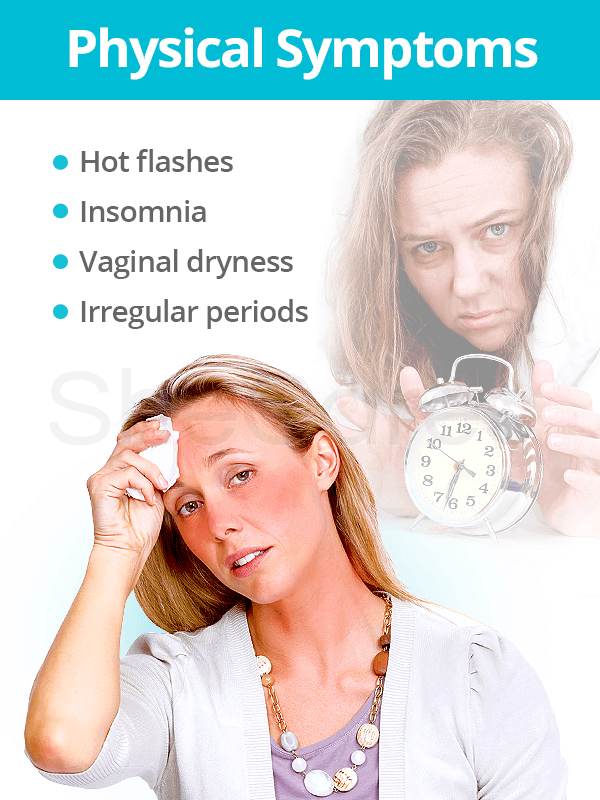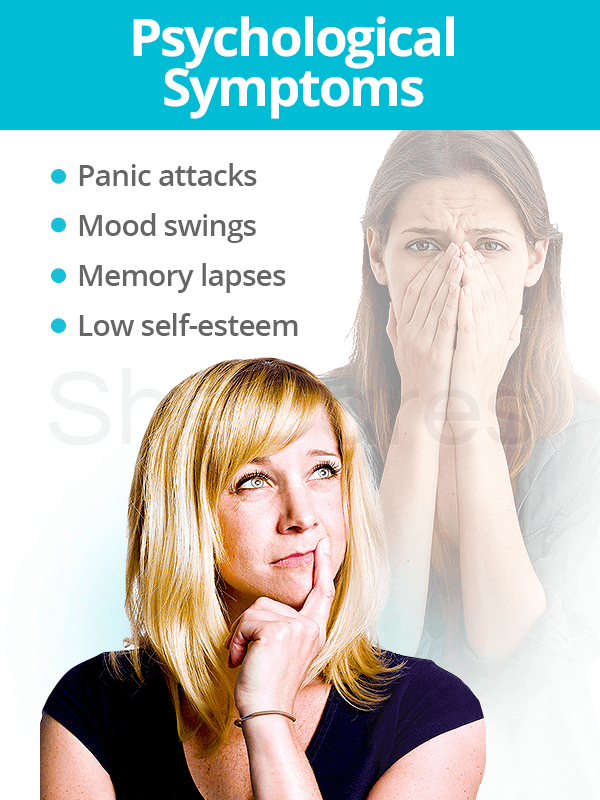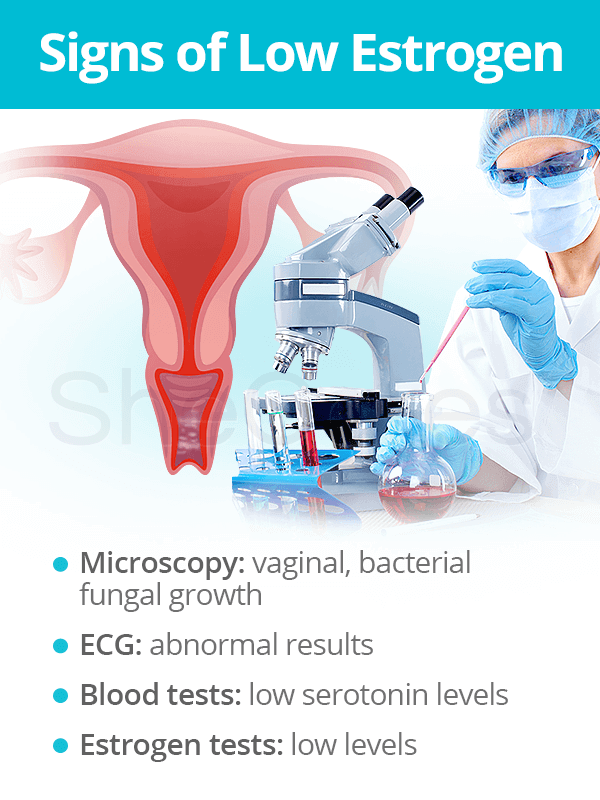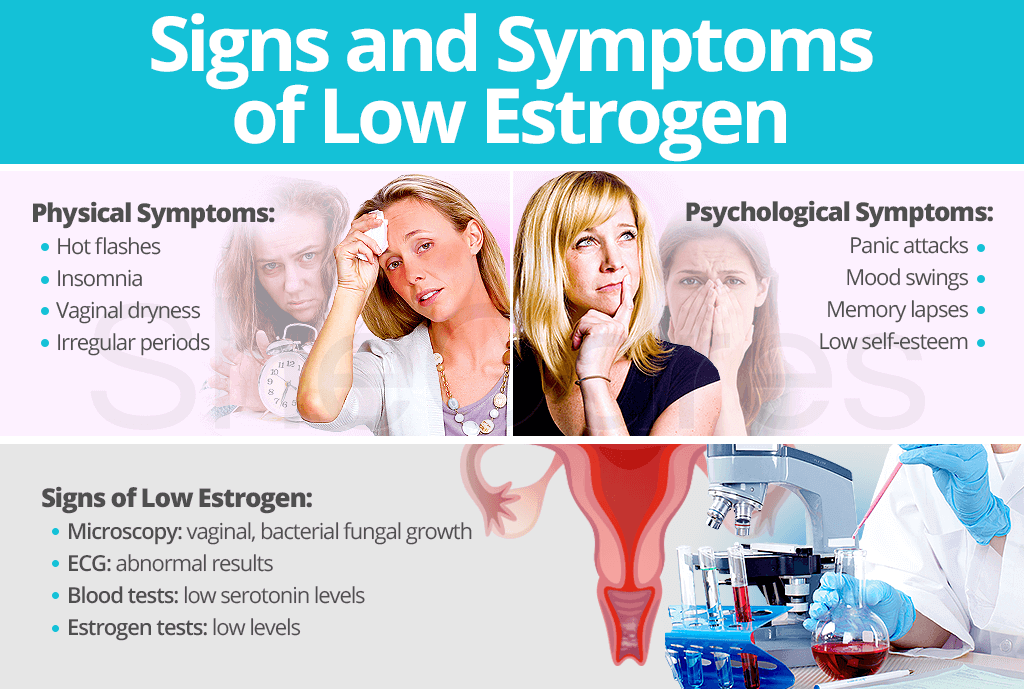Normal estrogen levels are essential for a woman's body to function properly. Consequently, when levels are too low, her body will take note accordingly.
Continue reading to find out more about the signs and symptoms of low estrogen in women as the first step toward hormonal equilibrium.
Symptoms of Low Estrogen Levels
When estrogen levels dip below normal, what results is a plethora of symptoms most typically associated with the menopausal transition. However, these symptoms can occur during any stage in life.
Women may not immediately recognize that the underlying cause is low estrogen levels as symptoms can be varied and subtle, easily attributed to a different source.
Physical Symptoms

- Back pain and joint pain
- Headaches and migraines
- Hot flashes
- Night sweats
- Insomnia
- Weight gain
- Vaginal dryness or infections
- Dry, itchy, or easily bruised skin
- Loss of libido
- Rapid heartbeat
- Bloating
- Thinning hair
- Incontinence
- Irregular or absent periods
Psychological Symptoms

- Anxiety
- Panic attacks
- Low self-esteem
- Mood swings
- Memory lapses
- Difficulty concentrating
- Irritability
- Fatigue
Signs of Low Estrogen Levels
In addition to the most widely experienced symptoms outlined above, there are a number of signs that one might not normally equate with low estrogen levels.
As opposed to more evident symptoms, medical signs are measurable criteria that are usually assessed by a physician to help identify a diagnosis of hormonal imbalance.

- Vaginal pH testing exceeding 5.0
- Microscopy showing vaginal or bacterial fungal growth
- Abnormal electrocardiogram (ECG) results
- Estrogen tests (blood, urine, or saliva) proving low estrogen levels
- Blood tests showing low serotonin levels
When estrogen levels remain low for a more permanent amount of time, more serious conditions may develop from an estrogen deficiency.
Continue reading to learn more about two major, life-threatening health conditions caused by consistently low levels of estrogen.
Osteoporosis and Low Estrogen
Osteoporosis is a degenerative disease that makes bones thinner, weaker, and more susceptible to fractures. Estrogen helps prevent bone loss by keeping osteoclasts - bone-absorbing cells - at a controlled amount while improving the body's absorption and retention of calcium.
If bone degrades quicker than it is produced due to an estrogen deficiency, a woman's chances of developing osteoporosis at some point during the menopausal transition increase.
Heart Disease and Low Estrogen
Moreover, heart disease is also a major condition that can arise with consistently low estrogen levels since the hormone plays an instrumental role in the organ's health.
Estrogen helps regulate cholesterol production, thus decreasing the build-up of plaque in coronary arteries. It also helps keep blood vessels pliable and strong to allow for appropriate expansion and relaxation. But as a woman ages, an estrogen deficiency makes her more susceptible to contracting atherosclerosis and heart disease.
Find out more about how to increase estrogen levels and finally achieve hormonal balance.
Sources
- American Heart Association. (2015). Menopause and Heart Disease. Retrieved August 22, 2017, from http://www.heart.org/HEARTORG/Conditions/More/MyHeartandStrokeNews/Menopause-and-Heart-Disease_UCM_448432_Article.jsp#.WWfN5VGQyUk
- Culligan, P.J. & Heit, M. (2000). Urinary Incontinence in Women: Evaluation and Management. American Family Physician, 62(11), 2433-2444. Retrieved August 21, 2017, from http://www.aafp.org/afp/2000/1201/p2433.html
- Kingsberg, S.A. et al. (2009). Treating dyspareunia caused by vaginal atrophy: a review of treatment options using vaginal estrogen therapy. International Journal of Women's Health, 1, 105-111. Retrieved August 21, 2017, from https://www.ncbi.nlm.nih.gov/pmc/articles/PMC2971714/
- National Women's Health Resource Center. (n.d.). Could You Have Low Estrogen? | Atherosclerosis. Retrieved August 16, 2017, from http://www.healthywomen.org/content/article/could-you-have-low-estrogen | http://www.healthywomen.org/condition/atherosclerosis
- The North American Menopause Society. (2010). Changes in Hormone Levels. Retrieved August 16, 2017, from https://www.menopause.org/for-women/sexual-health-menopause-online/changes-at-midlife/changes-in-hormone-levels
- Northwestern University: Women's Health Research Institute. (2013). How Hormone Depletion Affects You. Retrieved August 16, 2017, from http://menopause.northwestern.edu/content/how-hormone-depletion-affects-you
- Riggs, B.L. (2000). The mechanisms of estrogen regulation of bone resorption. The Journal of Clincial Investigation, 106(10), 1203-1204. doi: 10.1172/JCI11468
- Väänänen, H.K. & Härkönen, P.L. (1996). Estrogen and bone metabolism. Maturitas, 23, Suppl S65-69. Retrieved August 21, 2017, from https://www.ncbi.nlm.nih.gov/pubmed/8865143



